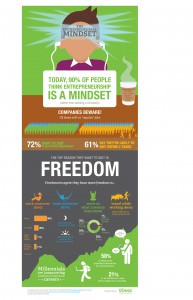How Millennials are changing corporate culture
Freelance work is enticing. You can work whenever and wherever you want. You work on projects that excite and inspire you. Freedom, according to oDesk, is the number one reason for becoming a freelancer today.
In the modern digital age it is easier than ever to become a freelancer. Several websites, such as oDesk and freelancer.com, offer to connect freelancers with employers. Freelancers are encouraged to set up an account and create a profile – similar to Facebook – and upload sample work. They can either pitch an idea to a company or respond to listings posted by companies.
There are currently about 62,000 freelancers in Canada. Projections indicate that freelancers will make up a significant proportion of the work force in the next few years. By 2020 more than 40 per cent of Americans will work as freelancers.
The word “entrepreneur”
The word “entrepreneur” has recently changed in meaning, according to oDesk. Before it was used to define someone who started his or her own company. This person had a brilliant idea along with the savoir-faire and investors to make their vision a reality. The results of the oDesk survey show that most people now believe an entrepreneur has a certain mindset. This type of person can see opportunities and go after them.
“The redefinition of entrepreneurship and increased opportunity for all matters because it opens more doors – for the Millenial generation especially – to think big,” says Gary Swart. “The entrepreneurial mindset is also becoming an important asset for corporate careerists. Companies respect those who bring an entrepreneurial mindset to the table – it means they see opportunities and are willing to take the risks required to seize them.”
Everyone is an entrepreneur now, according to the headline of Jana Kasperkevic’s article on Inc.com. While this may or may not be true, it’s clear that
many people want to be one. Websites for the potential entrepreneur abound – www.Entrepreneur.com and the Forbes Entrepreneur section are just two examples.
Universities are recognizing this interest and adjusting their curriculum to accommodate it. McGill University is launching a new major concentration in Entrepreneurship at the Desautels Business School. Required courses include “Fundamentals of Entrepreneurship” and “Entrepreneurship in Practice.” The concentration is described as giving students “an understanding of the key concepts and processes involved in starting and managing new ventures.”
Backlash
There is one problem now that everyone is an entrepreneur – most employees see themselves as “free agents” and are always looking for more promising opportunities. In return employers have no qualms about cutting employees if costs need to go down or they want fresh ideas. This produces high turnover and holds back productivity.
Harvard Business Review writers Reid Hoffman, Ben Casnocha, and Chris Yeh think there needs to be a new employer-employee compact. The authors call for an alliance between employers and employees. This way both parties would figure out how they can mutually benefit from their relationship and this would allow them to adapt. Both sides would recognize that the arrangement is temporary, which in fact encourages greater risk.
However temporary your job may be, there’s no denying how awesome the new entrepreneurial culture can be. In a recent article on coaxing efficiency out of employees, Entrepreneur.com points out that a fun work environment actually improves employee productivity.
[pullquote]The redefinition of entrepreneurship and increased opportunity for all matters because it opens more doors – for the Millenial generation especially – to think big[/pullquote]
Michael Kern, the executive creative director at We Like Small – a digital agency in Salt Lake City, wholly embraces this philosophy. In an interview with Entrepreneur.com he revealed the 6” rule he applies in his own workplace. “If it snows more than [six inches], and your projects can handle it, you should be out skiing.” Talk about your dream job.
Click to expand infographic.
Tom DiNardo has a B.A. in History from McGill University. Tom is passionate about reading, writing, and experiencing all that life has to offer. He is currently living and working in Montreal, Quebec.


































Share the post "How Millennials are changing corporate culture"